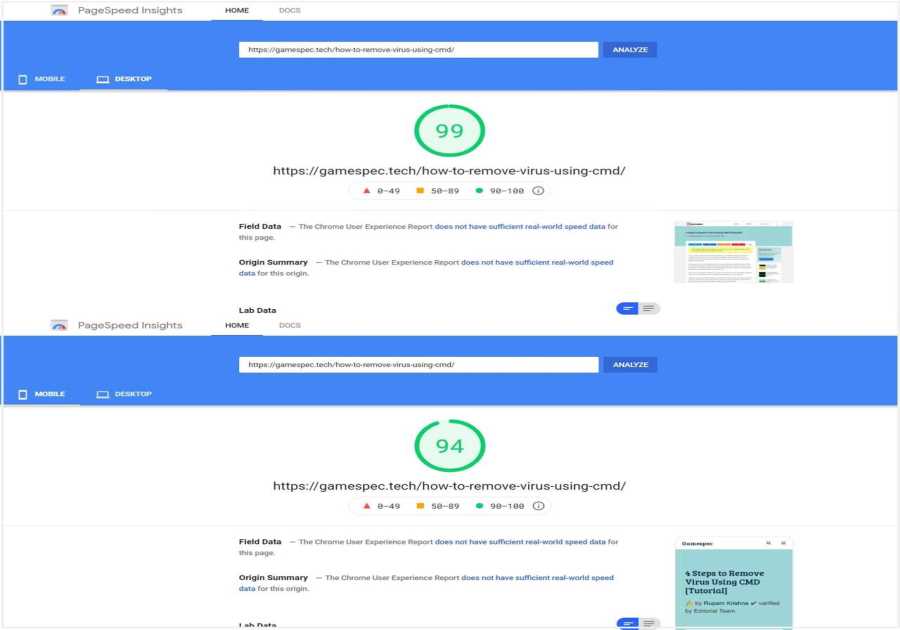

Disclosure: This content is reader-supported, which means if you click on some of our links that we may earn a commission.
In the world of web hosting, two big names are considered a cut above the rest—Bluehost and HostGator. Both web hosting providers assure top-tier service in an already saturated market with low-quality hosting options.
But which one is truly the best web hosting service?
If you read my past articles, you’ll know I’m a champion for Bluehost. But even keeping my personal bias aside, when I look at hard cold facts, Bluehost is still victorious over HostGator.
While HostGator isn’t far behind, Bluehost’s appealing packages hit the sweet spot of affordability and usability—something both beginners and veterans will appreciate.
Read on to learn more about the reasoning behind my verdict.
Bluehost or HostGator: Which is Better?

Bluehost can be a godsend for WordPress novices and experts, and those would want a highly-affordable hosting plan. It has a clearly organized dashboard with excellent customer support and several great features. No wonder it’s one of three sites recommended by WordPress itself. If this sounds like your wishlist, make sure you sign up for a free trial with Bluehost.

HostGator is an insanely powerful web hosting provider that gives you excellent uptime and an in-depth (and fast!) customer support system. Its feature-rich hosting plans include free website migration and an integrated site builder, making it a good choice for all levels of users. If you’re considering giving it a try, check it out here.
Review of the Best Web Hosting ServicesIf you’re looking for a credible hosting solution for your website, you don’t have to restrict your options to Bluehost or HostGator.
There is plenty of fish in the sea.
Head over to our best web hosting service guide to find the perfect match for yourself based on your specific needs. From shared hosting options for startups to ecommerce hosting to scalability, we have something for everyone. And both HostGator and Bluehost made the list!
Bluehost Wins
WordPress-Approved: An official endorsement for a company from WordPress means a lot to those looking for a WordPress hosting provider. Precisely why I just had to include how one of the largest (and possibly the most renowned) hosting platforms, WordPress gives Bluehost the top spot on its list of the best WordPress web hosting providers.
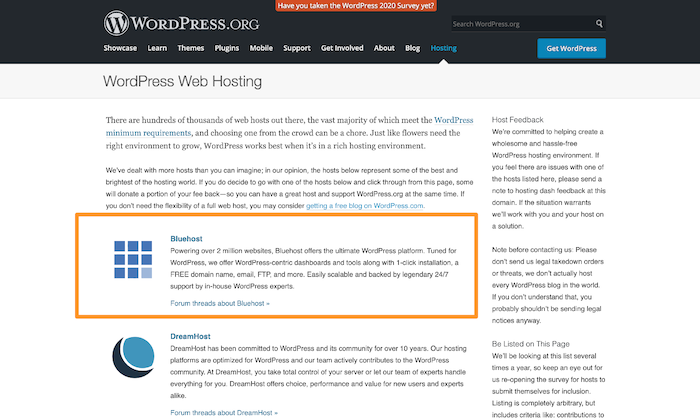
Super Fast: With an endorsement like that, one would expect the loading speed to be fast, and Bluehost certainly doesn’t disappoint. If you want to make your business successful, you need fast site load speeds and server response time. Bluehost’s speed is way faster than Google‘s recommended 200ms in most countries like the US (23ms) and Canada (92ms). The average worldwide score stands proud at 153ms.
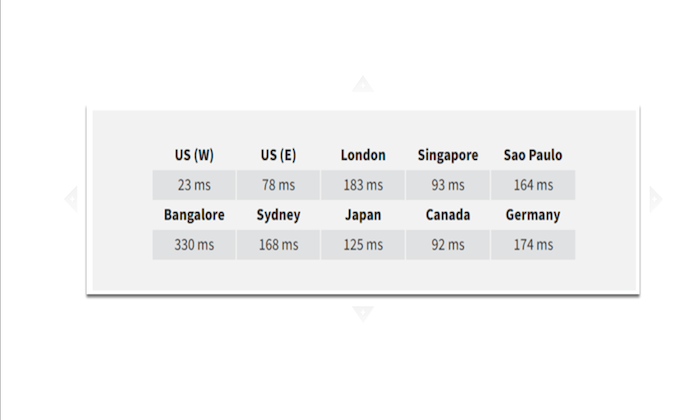
Incredible Server Uptime: Uptime refers to the portion of time that your site is online. This is incredibly important because how else will your users access your site if it’s offline? The industry standard for hosting companies is around 99%, but Bluehost outdoes this, with its average coming up to 99.9%. While this is the minimum for their lower-level shared hosting plans, if you opt for its dedicated hosting of VPS hosting plans, you can expect it to touch near 100%.
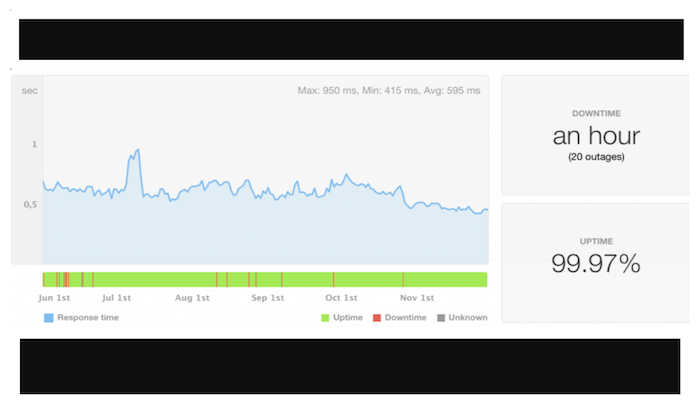
Image Source: Who Is Hosting This
Flexible and Scalable: Bluehost subscription plans are tailored to suit all kinds of users’ needs and give you enough flexibility to expand without having to switch hosting providers. Upgrading to a higher-tiered hosting plan or something else altogether can be done seamlessly, without your site having to experience any downtime during the move. Moreover, Bluehost has a custom interface that allows you to monitor and manage server resources to determine the right time to upgrade.

Solid Customer Support: You won’t necessarily need Bluehost customer support daily, but when you do, just know it’s rock-solid and efficient. You can get the solutions to your problems via live chat, phone support dedicated to different hosting types, and of course, social media support. Besides, Bluehost support can resolve support issues before you talk to a qualified professional—all you need to do is refer to the extensive support library that contains hundreds of detailed walkthroughs and FAQs to fix common problems.
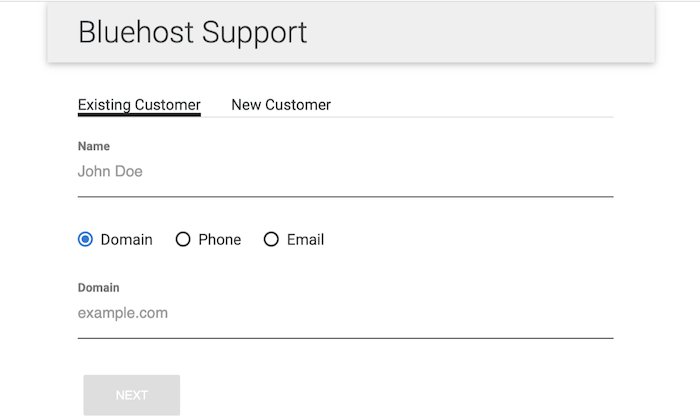
Top-Notch Security: Bluehost always offers its users good website protection. It provides secure shell access (SSH) to allow admin and web devs to securely access config files. They also use anti-spam tools like SpamExperts, Spam Hammer, and Apache SpamAssassin to keep bot attacks at bay. Other security features include password-protected directories, IP address blacklist, email account and user account filters, and digital certificates and private keys management access.
App and Integration Library: One of the biggest USPs of Bluehost is its massive application library. You can enable all kinds of services and software through this app to add more functionality to your site and hosting account. You can add eCommerce functionality as well as plug your hosting account into Google apps, which, in turn, will give you direct access to an even more extensive plugin library to choose from.
Offers Freebies That Matter: Many web hosting providers give their customers freebies. Sadly, most of them are shallow and don’t offer any value. After all, what else are you supposed to do with free 24/7 support or free WordPress installation? Not Bluehost, though. All of its hosting plans include a free domain name (for the first year), a free SSL certificate, and even daily backups and website restoration.
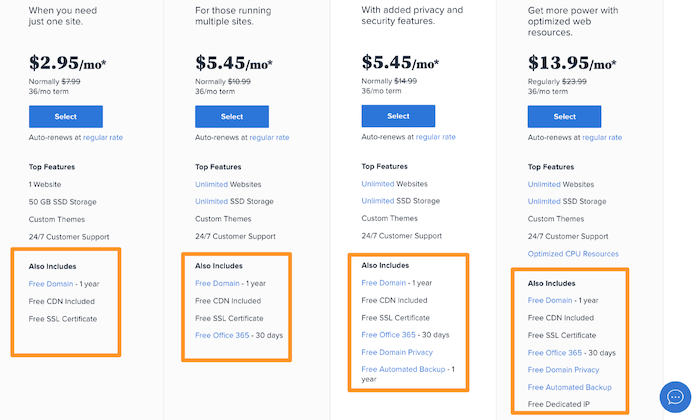
Bluehost Losses
Higher Renewal Prices: The introductory prices of Bluehost makes it one of the most affordable hosting providers. However, make sure you’re ready for a price jump when you renew your subscription. While this isn’t an issue unique to Bluehost as every hosting company does it, it’s important to point out to help you make the right decision.
No Uptime Guarantee: Downtime is detrimental to any website as it indicates the possibility of losing potential sales and conversions. It’s also why an uptime guarantee is important. Bluehost does offer excellent uptime, but as there’s no guarantee, you can’t expect compensation if you face downtime that’s below the specified percentage. Considering most of the hosting providers’ rivals do give a guarantee to their users, one can only wish for Bluehost to follow suit.
No free site migration or ASP.net/Windows Hosting: Many hosting services offer free migrations if you want to move an existing site to their servers, but unfortunately, Bluehost doesn’t. If you don’t want to migrate your site over to Bluehost, you’re going to have to pay a fee of $149.99 to migrate up to five websites and 20 email accounts. Additionally, Bluehost is a Linux-only hosting company, which means there’s no support for websites that need a Windows server to run. As a majority of the market use Linux, this isn’t a deal-breaker. But if you need Windows servers, you may want to look elsewhere.

HostGator Wins
Reliable and Strong Uptime Guarantee: HostGator consistently posts a 99.98-100% uptime, and this consistency isn’t without reason. The hosting service offers an uptime guarantee, according to which if they drop below 99.90%, users will receive one month of credit on their accounts. However, keep in mind that this is the standard as anything less isn’t generally tolerated.

(Almost) Unlimited Everything: HostGator offers unlimited everything—well, sort of. You can expect unlimited disk space that allows you to store as much data as you need and an unmetered bandwidth that allows you to move an unlimited amount of data between your host server, site visitors, and the internet. What’s more, you also get unlimited databases, meaning you can have as many WordPress installs as you want. This can be particularly useful for those who have several clients and want to test website changes before making them live. But keep in mind, there are certain conditions like not using more than 25% of the server’s CPU, not sending more than 500 emails per hour, and so on, to keep things “unlimited.”

Best cPanel Hosting: No web hosting provider offers a better version of cPanel than HostGator. And this isn’t an empty claim. You’ll find all sorts of tools and options to manage your site and domain from one place, with the cPanel Control Panel particularly having many such tools. This includes file manager, FTP with user management, backup wizard, disk usage, domain manager, domain forward, DNS, database access through PHPMyAdmin, file compression, file upload, and file download.

One-Click Install and Free Site Transfer: HostGator makes installing your preferred CMS as easy as clicking a few buttons. You can also use its unique QuickInstall tool to set up your website despite not having any technical knowledge. In addition to this, you can transfer from another host to them without any hassle. All you need to do is sign up for a plan you wish to use, and HostGator will take care of the rest. Easy!

Free SSL and Domain: You can’t expect a premium quality SSL certificate from every hosting provider, and you certainly can’t expect it for free. However, HostGator breaks this notion by providing Comodo SSL for all users and their hosted domains. So, you don’t have to worry about encryption between your website on the web browsers you use. You also get a free domain for one year—provided you sign up for hosting plans that offer this freebie.
HostGator Losses
Limited Features: While the unlimited bit sounds nice, one can’t help but notice that most features offered by HostGator are pretty standard. Also, shared hosting users can’t expect extras and will have to manually handle their websites’ administrative work. Ensuring daily backups, updating any core, plugins, themes, and security measures are entirely your responsibility.
Slow Customer Support: HostGator offers 24/7 hosting customer service via live chat, phone, and email. And their support team is willing to help you and fix most of the issues you face, but it isn’t necessarily the best in the industry. Many customers have complained about slow support responses, which can get particularly annoying when you get stuck while doing something important and need immediate help.

No Free Daily Backups: If there’s one thing that every blog must have, it’s a daily backup facility. Unfortunately, you won’t find any daily backup guarantee with HostGator as they only offer one backup a week. Besides, you won’t be able to restore the site unless you pay for that. I recommend installing a plugin that does daily backing up for you. You can choose HostGator’s premium backup and restore tool called CodeGuard that costs a one-time of $24 per year. Or you can select a WordPress tool to create a copy of the entire site and send it to Amazon, Google Drive, or Dropbox.
Comparing the Top Ecommerce Platforms
There’s no doubt that Bluehost and HostGator are two of the leading web hosts that offer exceptional service. But you can always look for other alternatives—one that has all the features you need and meets your budget.
We’ve compiled a list of the best web hosting services to help you determine your right match.
Dreamhost — Best option if you want quick and responsive website changesHostinger — Low-Cost shared hosting options for startupsBluehost — Best for WordPress hostingNexcess — Best eCommerce hostingHostGator — Most affordable option for startupsWP Engine — Best option if you know your limitsInMotion — Best option for scaling BIGSiteground — Best for WooCommerce hostingTo recap, Bluehost is better than HostGator. But the latter comes a close second.
You should consider Bluehost if you want an affordable hosting plan that offers excellent WordPress-specific support, along with some fantastic freebies. HostGator will make a better choice if you want higher uptime and an intuitive cPanel control panel.
Regardless of your choice, you can be sure to have a reliable web hosting provider that ensures your site stays functional all year long, helping you provide a better customer experience while maximizing conversions and revenue.
The post Bluehost Vs. Hostgator appeared first on Neil Patel.
By: Neil Patel
Title: Bluehost Vs. Hostgator
Sourced From: Original article available: neilpatel.com/blog/bluehost-vs-hostgator/
Published Date: 2021 02 07



